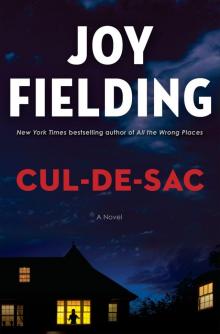- Home
- Joy Fielding
Still Life Page 2
Still Life Read online
Page 2
“Oh, you’ll love it,” Casey said. “It’s fabulous. I saw the original on Broadway a few years ago.”
“Of course you did.” Janine smiled as she pushed herself off her chair and to her feet. “And this week you’ll be with your fabulous husband, making fabulous babies together. I’m sorry,” she said in the same breath. “I’m being a real bitch. For sure I’m PMS-ing.”
“Where are you off to now?” Gail asked Casey as they retrieved their coats from the maître d’.
“Think I’ll just stick around here. I was debating going for a run, but I don’t think I have enough time before my next appointment.” Casey checked her watch. It was a gold Cartier, a gift from her husband on their second anniversary last month.
“Save your energy for tonight,” Janine advised now, leaning forward to kiss Casey on the cheek. “Come on, Gail, I’ll give you a ride back to work.”
Casey watched her two friends walk down South Street arm in arm, thinking them an interesting study in contrasts: Janine tall and contained, Gail shorter and spilling out in all directions at once; Janine an expensive glass of champagne, Gail a mug of draft beer.
Which made her—what? Casey wondered. Maybe she should try a more current hairstyle. Although when had long blond hair ever really gone out of fashion? And it suited the soft oval of her face, her fair complexion and delicate features. “Don’t even try to tell me you weren’t prom queen,” Janine had said shortly after they met, and Casey had laughed and kept silent. What could she say, after all? She had been prom queen. She’d also been captain of the debating and swim teams, and scored near perfect on her SATs, but people were always less interested in that than in how she looked and how much she was worth. “Someone just told me your old man is worth gazillions,” Janine had remarked on another occasion. Again Casey had remained silent. Yes, it was true her family was almost obscenely wealthy. It was also true that her father had been a notorious ladies’ man, her mother a self-absorbed alcoholic, and her younger sister a drug-fueled party girl on her way to becoming a total screwup. Four years after Casey graduated college, her parents were killed when their private jet crashed into Chesapeake Bay during inclement weather, officially making her sister a total screwup.
It was these thoughts that were absorbing Casey’s attention as she walked along South Street, Philadelphia’s answer to Greenwich Village, with its collection of pungent smells, seedy tattoo parlors, funky leather shops, and avant-garde galleries. Truly a world unto itself, she was thinking as she crossed into South Philly and headed toward the large indoor parking garage on Washington Avenue. That was the problem with having lunch in this area—it was almost impossible to find a place to park, and once you got away from South Street, the dividing line between Center City and South Philadelphia, you were pretty much in Rocky territory.
Casey entered the parking garage and took the elevator up to the fifth floor, retrieving her car keys from her oversize black leather bag as she walked toward her white Lexus sports car at the far end of the platform. She heard the gunning of an engine in the distance and looked over her shoulder, but she saw nothing. Aside from the rows of multicolored automobiles, the place was deserted.
She didn’t hear the car until it was almost on top of her. She was approaching her Lexus, right arm extended, thumb on the button of the remote to unlock the driver’s door, when a silver-colored SUV came careening around the corner toward her. She didn’t have time to register the driver’s face, to ascertain whether a man or woman was behind the wheel. She had no time to get out of the way. One minute she was walking toward her car, the next she was being propelled through the air, her arms and legs shooting into four different directions at once. Seconds later, she came crashing down, a limp repository of broken bones, her head slamming against the hard pavement.
Shortly after that, the SUV disappeared into the streets of South Philadelphia, and Casey Marshall slipped into oblivion.
TWO
She opened her eyes to darkness.
And not just ordinary darkness, Casey thought, straining to catch even a glimmer of light. It was the blackest black she’d ever seen, a wall of impenetrable density she couldn’t see over or around, affording not even a hint of shading or shadow. As if she’d fallen into a deep underground cave. As if she’d accidentally stumbled into the black hole of the universe.
Where was she? Why was it so dark?
“Hello? Is anybody there?”
Was she alone? Could anybody hear her?
There was no answer. Casey felt a tiny bubble of panic materialize inside her chest and tried to control its growth with a series of measured, deep breaths. There had to be a logical explanation, she assured herself, refusing to give in to her fear, knowing that if she did, it would expand until there was no room for anything else, and then the now monstrous bubble would burst, spreading its poison through out her veins and circulating to every part of her body.
“Hello? Can anybody hear me?”
She opened her eyes wider, then squinted, hearing Janine’s reprimand in the back of her head, reminding her that squinting causes wrinkles. “Janine,” Casey whispered, vaguely recalling their lunch together…. When? How long ago?
Not long, Casey decided. Hadn’t she just left her? Yes, that was right. She’d had lunch with Janine and Gail on South Street—she’d had a delicious warm chicken and papaya salad and a glass of pinot grigio—and then headed over to Washington Street to retrieve her car. And then what?
And then … nothing.
Casey pictured herself walking up the sloping concrete of the old parking garage toward her car, heard the heels of her black Ferragamo pumps clicking along the uneven pavement, and then another sound, a rumble, like distant thunder. Coming closer. What was it? Why couldn’t she remember?
What was happening?
It was at that precise moment Casey realized she couldn’t move. “What …?” she began, and then stopped, the bubble in her chest instantly metastasizing into her throat, robbing her of her voice. Why couldn’t she move? Was she tied down?
She tried to lift her hands but she couldn’t feel them. She tried kicking her feet, but she couldn’t locate them either. It was as if they didn’t exist, as if she was a head without a torso, a body without limbs. If only there was some light. If only she could see something. Anything that would give her a clue as to her predicament. She didn’t even know if she was lying down or sitting up, she realized, trying to turn her head; when that failed, she strained to lift it.
I’ve been kidnapped, she thought, still trying to make sense of her situation. Some lunatic had snatched her from the parking garage and buried her alive in his backyard. Hadn’t she seen a movie like that a long time ago? It starred Keifer Sutherland as the hero and Jeff Bridges as the villain, and hadn’t Sandra Bullock played the small part of Keifer’s girlfriend, the poor unfortunate who was chloroformed at a gasoline station and came to in an underground coffin?
Oh, God, oh, God. Had some lunatic seen that movie and decided to play copycat? Stay calm. Stay calm. Stay calm.
Casey fought to regain control of her now ragged breathing. If she had been kidnapped, if she was lying in a coffin beneath the cold ground, that meant her supply of air was limited, and it was imperative she not waste it. Although she didn’t feel a lack of air, she realized. Nor did she feel cold. Or hot. Or anything.
She felt nothing at all.
“Okay, okay,” she whispered, straining to see traces of her breath in the darkness. But again there was nothing. Casey closed her eyes, counting silently to ten before reopening them.
Nothing.
Nothing but deep, unending blackness.
Was she dead?
“This can’t be happening. It can’t be.”
Of course it wasn’t happening, she realized with a sudden rush of relief. It was a dream. A nightmare. What was the matter with her? Why hadn’t she realized this before? She could have spared herself a lot of needless grief and wasted energy. She sho
uld have known all along she was dreaming.
Now all she had to do was wake herself up. Come on, silly. You can do it. Wake up, damn you. Wake up.
Except she couldn’t remember having gone to bed.
“But I must have. I must have.” Obviously, the whole day had been a dream. She hadn’t met with Rhonda Miller at nine o’clock this morning to discuss her ideas for decorating the Millers’ new riverside condominium. She hadn’t spent a couple of hours checking out the wide assortment of materials on Fabric Row. She hadn’t met her friends for lunch at Southwark. They hadn’t talked about Janine’s hair or her unpleasant encounter with Richard Mooney. The little twerp, Janine had called him.
Since when had she ever been able to recall her dreams in such vivid detail? Casey wondered. Especially while she was still dreaming them. What kind of nightmare was this? Why couldn’t she wake up?
Wake up, she urged. Then again, aloud, “Wake up.” And then, louder still. “Wake up!” She’d read somewhere that you could sometimes jolt yourself awake with a loud scream, a scream that would literally push you from one level of consciousness to another. “Wake up!” she screamed at the top of her lungs, hoping that she wouldn’t frighten Warren, who was undoubtedly sleeping peacefully beside her in their king-size bed, his arms wrapped loosely around her.
Maybe that was why she couldn’t move. Maybe Warren had fallen asleep with his body draped across her side, or maybe their down-filled comforter had twisted itself around her, like a cocoon, preventing her from moving or feeling her arms and legs. Except Casey knew even as she was thinking these thoughts that they weren’t right. She’d always been able to sense when her husband was close by. Now she had no sense of anything.
Warren Marshall was almost six feet tall and 185 pounds of well-toned muscle, thanks to thrice-weekly workouts at the small boutique gym in the upscale Main Line suburb of Rosemont, where they lived. Casey could detect no hint of his presence, no whiff of his clean, masculine smell.
No, she realized, as a new bubble of fear took root in her belly. Warren wasn’t here. Nobody was here. She was all alone.
And she wasn’t dreaming.
“Somebody,” she cried. “Somebody, please help me.”
Her words echoed in her ears, causing only a few ripples in the overwhelming silence that surrounded her. Casey lay in her black hole, waiting in vain for her eyes to adjust to the darkness, and cried into the void.
She fell asleep and dreamed she was a child playing golf with her father. She was only ten the first time he’d taken her to Merion Golf Club, the exclusive private course where he was a member, and he’d spent hours on the range with her, patiently working with her to perfect her swing, proudly proclaiming to anyone within ear shot that she was a natural. She was twelve the first time she broke a hundred, fifteen the first time she broke ninety, twenty when she got the first of her two hole-in-ones. She remembered offering to help her younger sister with her game, but Drew had turned her down flat, preferring to flail around helplessly, throwing her clubs to the ground, and then storming off the course in a snit. “Let her go,” she could hear her father say. “You’re the athlete in the family, Casey.” Hadn’t he named her after Casey Stengel? he reminded her. “So, all right, I picked the wrong sport,” he’d say, laughing, and her mother would roll her pale blue eyes and turn aside to stifle a yawn, having heard the anecdote too many times to find it even vaguely amusing anymore. If indeed she ever had.
“Okay, can somebody bring me up-to-date, please?” Casey heard her father say now.
Casey felt the air around her head begin to swirl, as if someone were shaking a tambourine near her face.
“Yes, Dr. Peabody,” her father said.
Who was Dr. Peabody? Dr. Marcus was their family physician, and had been ever since she could remember. So who was this Dr. Peabody? And what was he doing in her dream?
It was then that Casey realized she was no longer asleep, and that the voice she’d been hearing belonged not to her deceased father but to someone who was alive and well and standing not very far away. She opened her eyes. It was still pitch-black, so she couldn’t see anybody. But at least she wasn’t alone, she realized gratefully. And the voices were definitely close at hand. Surely sooner or later, somebody would stumble across her. All she had to do was use her own voice to guide them.
“I’m over here,” she shouted.
“The patient,” someone answered, ignoring her outburst, “is a thirty-two-year-old woman who was the victim of a hit-and-run accident approximately three weeks ago. March twenty-sixth, to be exact.”
“Hey, you,” Casey called out. “Dr. Peabody, I presume! I’m over here.”
“She’s on life support, having suffered multiple traumas, including multiple fractures of the pelvis, legs, and arms, all of which required extensive surgeries,” the doctor continued. “The external fixators in her bones will be in place for at least another month, as will the casts on her arms. More seriously, there was massive bleeding to the abdomen, which led to bleeding into the abdominal cavity. Doctors did an exploratory laparotomy and discovered a ruptured spleen. A splenectomy was then performed.”
What the hell was he talking about? Casey wondered. Who was he talking about? And why did his voice keep going in and out, strong one minute, and then weak the next? Was it even a man’s voice? she wondered. And why did it sound so heavy, as if it were covered in a thick coat of molasses? Were they underwater? “Hey,” she called out. “Do you think you could talk about this later? I’d really like to get out of here.”
“Luckily, an MRI determined that there wasn’t any spinal fracture of the neck or back, which could have led to lower-extremity paralysis….”
“‘Luck’ being an odd choice of words in this case, wouldn’t you say, Dr. Peabody?” the first voice interrupted. “Considering the fact the patient might be in a coma for the rest of her life.”
What patient? Casey wondered. Who were these people? Was she in the basement tunnel of a hospital? Was that why it was so dark? How had she gotten here? And why couldn’t anybody hear her? Were they farther away than she’d first assumed?
“Yes, sir. I didn’t mean to suggest—”
“Dr. Benson, would you like to continue?”
Dr. Benson? Who was Dr. Benson?
“The patient was found to have a subdural hemorrhage,” another voice continued, although it was getting hard to distinguish one voice from the next, “and Dr. Jarvis drilled a burr hole into the skull to remove the blood from just beneath the skull bone, in order to let it drain out.”
“And the prognosis?”
“Generally good in most cases, especially when the patient is young and in as good physical condition as Mrs. Marshall….”
Mrs. Marshall? Mrs. Marshall? “Excuse me, but that’s my name.” Who were they talking about? Was there another Mrs. Marshall? Or was this some sort of elaborate hoax cooked up by Janine? “Okay, guys. You’ve had your fun. Enough is enough. Would somebody please just tell me what’s going on?”
“… But the patient also sustained a major concussion to the brain, which led to a coma. We’ve performed several MRIs over the last three weeks, which show the subdural hemorrhaging is dissolving and clearing up, but the shock to the brain continues, so it’s too early to know whether the damage is permanent or not.”
“So, tell me, Dr. Rekai,” the doctor in charge said. “What’s the ultimate prognosis?”
“It’s impossible to know for sure at this time,” came the reply. “The patient’s brain has been rocked, as they say.”
“Who says that?” Casey demanded, indignant at the casual brutality of the assessment. Some poor woman was in a coma and they were being insensitive and glib about her condition.
“How long do you estimate she’ll remain on life support?” someone asked.
“Her family is very unlikely to consider taking her off life support at this time. Nor would the hospital approve any attempt to do so. The patient has a strong
heart, and her body is functioning, so we know her brain is functioning, albeit at a decreased level of activity. Casey Marshall could be on the ventilator for years, or she could wake up tomorrow.”
“Casey Marshall?” Casey repeated incredulously. What was he talking about? The likelihood of there being more than one Casey Marshall …
“Is the fact she opened her eyes yesterday of any significance?” somebody asked.
“Unfortunately not,” came the immediate answer. “It’s not unusual for a comatose patient to open her eyes. As you know, it’s an involuntary action, as is blinking. She can’t see anything, despite the fact her pupils are reacting to light.”
Again Casey felt movement around her, although she couldn’t process what it was. What light were they talking about?
“And the trach tube?”
“We’ll be performing a tracheostomy tomorrow afternoon.”
“A tracheostomy?” Casey demanded. “What the hell is that?”
“Dr. Benson, would you care to tell us about what’s involved in a tracheostomy?”
“You heard me?” A wave of exhilaration washed over Casey. “You actually heard my question! Thank God. Oh, thank God. I’m not the woman you’re talking about, that poor woman in a coma. You had me so worried.”
“A tracheostomy is normally performed on a patient after they’ve been on a trach tube for more than a few weeks,” Dr. Benson replied. “If the patient isn’t suffering from respiratory distress and is relatively comfortable, as this patient seems to be, then a tracheostomy should be performed or the tube will erode the trachea.”
“And what exactly is involved in this procedure, Dr. Zarb?”
Dr. Zarb? Dr. Rekai? Dr. Benson? Dr. Peabody? How many doctors were there? Why couldn’t she see any of them? And why did they continue to ignore her? She wasn’t the woman they were talking about, this poor unfortunate in a coma. Possibly for years. No, it couldn’t be. Possibly for the rest of her life. Dear God, no! It can’t be. It was too awful to even think about. I have to get out of here. I have to get out of here right now.

 The Stranger Next Door
The Stranger Next Door Cul-de-sac
Cul-de-sac The Final Act
The Final Act When I Looked Away
When I Looked Away She's Not There
She's Not There All the Wrong Places
All the Wrong Places Now You See Her
Now You See Her Don't Cry Now
Don't Cry Now Good Intentions
Good Intentions Still Life
Still Life Lost
Lost The First Time
The First Time Whispers and Lies
Whispers and Lies The Other Woman
The Other Woman Charley's Web
Charley's Web Mad River Road
Mad River Road Puppet
Puppet Life Penalty
Life Penalty The Wild Zone
The Wild Zone Home Invasion
Home Invasion Someone Is Watching
Someone Is Watching Heartstopper
Heartstopper See Jane Run
See Jane Run The Bad Daughter
The Bad Daughter Shadow Creek
Shadow Creek Missing Pieces
Missing Pieces Kiss Mommy Goodbye
Kiss Mommy Goodbye Grand Avenue
Grand Avenue